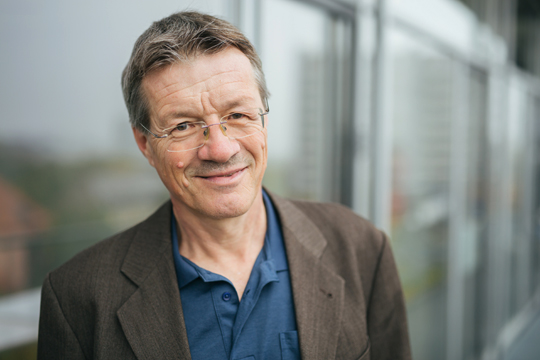A vote for top research
Freiburg, Nov 04, 2019
Nearly 150,000 scholars in Germany will be able to participate in an online election for their German Research Foundation (DFG) Review Board representatives until Monday, November 18, 2019 at 2 p.m. These representatives play a central role in scientific self-governance and in the evaluation of funding proposals. The Freiburg Romance scholar Prof. Dr. Daniel Jacob was an active member of the Review Board for Linguistics for eight years - according to the DFG's statutes, he is not allowed to run again after two terms of office. In an interview with Patrick Siegert, Jacob talks about his experiences and why it is so important for researchers to vote in the upcoming election.

Nearly 150,000 scholars in Germany will be able to participate in an online election for their German Research Foundation (DFG) Review Board representatives. Photo: Autthaseth/stock.adobe.com
Mr. Jacob, why did you become involved with the DFG?
Daniel Jacob: Being a member of a DFG Review Board is something special among the offices that academics can hold. With expertise and the right ethics, you can do a lot of good and also prevent bad things. Because we are familiar with each other’s expertise, we have to show that we make objective decisions and do not try to impose our own sub-discipline, mindset or school of thought. I was involved in the Review Board in order to demonstrate that, as a scientist, you have to be able to remove yourself from your position and also respect topics and procedures that have nothing to do with your discipline. Since membership is limited by statute to two terms of office, my involvement in the Review Board ends in February 2020.
What does a Review Board actually do?
The Linguistics Review Board is divided into several subgroups. I had been a candidate for the field of individual linguistics, but all the members of the Review Board have the same right to speak on all topics. The entire committee meets three times a year at the DFG Head Office in Bonn to examine about 60 applications for project funding. Applications are usually received by the DFG Head Office, which first submits them to external experts for review. The Review Board reviews both the quality of the assessments and the quality of the proposal; if all of it is acceptable, we then issue a funding recommendation. Rejected reports are reviewed in the light of the application. If necessary, the board will also make a different recommendation. However, the final decision lies with the Joint Committee of the DFG. In my time, however, it never happened that the Review Board's recommendation was disregarded.

Daniel Jacob was an active member of the Review Board for Linguistics for eight years. Photo: Sandra Meyndt
How does a candidacy work?
I was nominated by the German Society of Romance Philology. During my first term of office I was the only Freiburg scholar in the Linguistics Review Board. Prof. Dr. Christian Mair from the Department of English joined me a bit later. The University of Freiburg is represented in many DFG Review Boards. The selection procedure for candidates has changed several times. In the past, the DFG made a relatively independent selection from the proposals made by universities, professional associations and other eligible candidates; after much criticism, the number of nominations is now a formal criterion. At the last election, not all institutions entitled to nominate had understood this mechanism, which in part led to chaos. In the meantime, people have become better prepared for this procedure. Nevertheless, it is still under discussion.
Why is the election so important?
I am rather critical of the rationale behind third-party funding. Competitive thinking is basically not a bad thing, but there is a danger that everyday business in teaching and research will fade into the background. On the other hand, science must be financed. The DFG does high-quality work and uses honest and objective procedures to find out who is doing cutting-edge research in the community. However, the financial resources do not flow equally into all areas. The major philologies, for example, receive relatively less funding than smaller areas such as psycho- or computational linguistics. However, this is due to the number of applications submitted. Obviously the representatives in these fields have more time for applications than people in the subjects with many students. The Review Boards thus reflect the diversity of the applications received and of the entire research community as well as that which needs to be preserved.
Review Board election 2019
The DFG Review Board election for the 2020-2023 term of office will take place between October 21, 2019 and November 18, 2019. Votes will be cast online. All researchers who belong to a voting center - such as the University of Freiburg - who have passed the oral doctoral examination and are currently working in research at the election office are eligible to vote. At the University of Freiburg, around 4,100 people are currently eligible to vote.
More information

